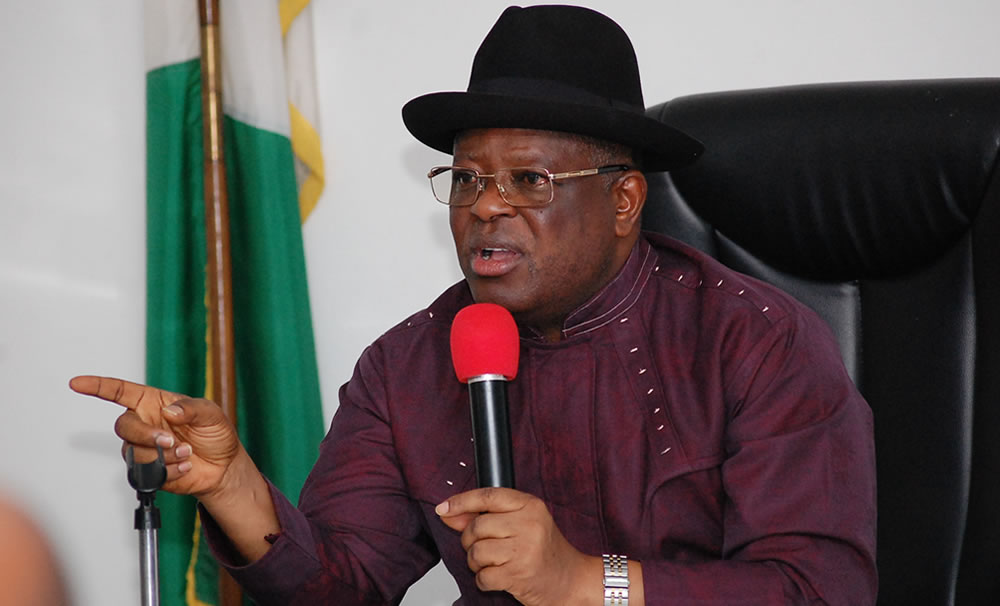![]()
The tolling of federal highways across the country is to start soon, Works Minister David Umahi hinted yesterday.
He said service stations and security patrols will be provided to compliment the toll plazas. Speaking during a media briefing in Abuja, the minister, lauded the move by Oyo State Governor Seyi Makinde to collaborate with his Lagos and Ogun counterparts – governors Babajide Sanwo-Olu and Prince Dapo Abiodun – light up the dual-carriage Lagos-Ibadan Expressway.
The reintroduction of toll gates was mooted under the watch of Mr. Babatunde Fashola as Works and Housing Minister during the administration of President Muhammadu Buhari.
The government announced identified preferred/reserved bidders for 12 federal highways which were listed for concession under the Highway Development and Management Initiative (HDMI).
The development followed the conclusion of the evaluation of the proposals submitted for Phase I of the Value-Added Concession (VAC) under the HDMI.
The HDMI is a Public-Private Partnership (PPP) initiated by the government to stimulate sustainable investment and funding in the development of road infrastructure.
The first phase of the VAC seeks to concession 12 economically-viable road corridors to technically and uncially capable private sector firms/consortia.
The 12 highways spanning 1,963 kilometres or 5.6 per cent of Nigeria’s 35,000 kilometres federal highways are: Benin-Asaba; Abuja-Lokoja; Kano-Katsina; Onitsha-Owerri-Aba; Sagamu-Benin; Abuja-Keffi-Akwanga; Kano-Maiduguri (Kano-Shuarin); Kano-Maiduguri (Potiskum-Damaturu); Lokoja-Benin; Enugu-Port Harcourt; Ilorin-Jebba; Lagos-Otta-Abeokuta and Lagos-Badagry-Seme Border.
Umahi said: “I was happy to hear from the governor of Oyo State that, (concerning) the famous Lagos-Ibadan, which is about 97 per cent on average completion, he is already talking with the governors of Lagos and Ogun states for a combined commitment and effort to put solar light all through the stretch of the road (Lagos-Ibadan).
“It is commendable and part of our renewed hope agenda to make our highways safer for our people; so that people can travel at night.
“Also, I am asking them to deploy CCTV, and of course, we are going to toll the road so that when we are having tolling, we are also going to be having service stations. We will also have security, that is, a rapid response squad.”
The minister also insisted that road contractors using asphalt would henceforth be made to sign an indemnity bond that will guarantee the durability of the roads for 30 years.
Admitting the use of concrete for road construction as the way to go, Umahi said the roads can last up to 50 years after completion, it will not force any contractor to use concrete. Hence, those insisting on using asphalt, must also guarantee the durability of the roads.
To ensure adequate funding for all ongoing projects, the minister spoke of a plan to plead with the National Assembly to, through the 2023 Supplementary Budget, restore the over N650 billion that was taken away from most of the ongoing projects.
Umahi said he has initiated talks cement manufacturers on the need to lower their price since concrete technology will increase their turnover.
He stated that constructing roads with concrete will not only attract investors, but also create jobs and opportunities for more indigenous contractors.
The minister said: “All we are saying to all contractors is that there are two choices to make. The first choice is that you must begin to do our roads according to the design. This means that the shelf life of our roads designed on asphalt is 30 years. You must ensure that it lasts for 30 years and give us an indemnity.
“The legal departments will draft the letters to them to come and sign, and commit to an affidavit that the roads that they are building must last 30 years. If you have already committed to asphalt, then you must be committed to the durability of the roads without excuse.
“Please, go ahead and use asphalt, no problems. But if you are afraid, then we can come over and we can agree on a redesign. This is not for roads that are about 80 per cent or 90 per cent in completion.
“Even if you have roads that are 90 per cent or 100 per cent completed, you must still give us that indemnity. Nigerians are tired of paying for jobs and they would not get value for it.
“About N650 billion was taken away and I don’t blame anybody because when Mr. President came on board, there was no money for these palliatives because of the subsidy removal, and that is a wise decision. So, this N500 billion and other funds for emergencies were taken away from the ongoing projects for 2022.
“When I went around, like in the Southwest, these projects had been stopped because there was no money to pay for them. My plea is that there are consequences of not returning the money. Some of the projects have reached 90 per cent, some 80 per cent and some 70 per cent. Some are those that will impact very seriously in our economic activities.
So, if you don’t have this money, there are consequences. One, you start paying interest on generated certificates – and this runs into millions. Second, the roads will not be completed.
“I believe that we have to count one before we count two in our budgetary system. These funds ought to be returned. Some of the funds are just part payment, and not the funds to complete all ongoing projects.”
Credit: The Nation





